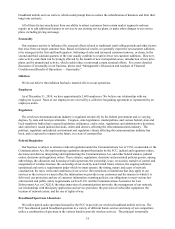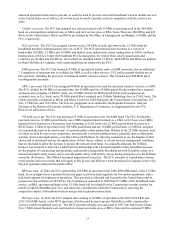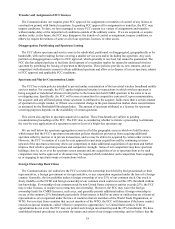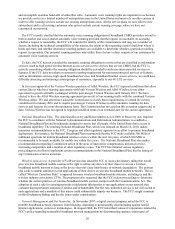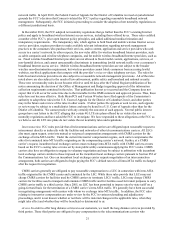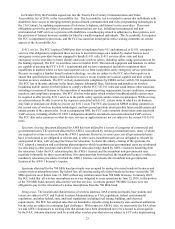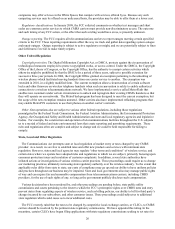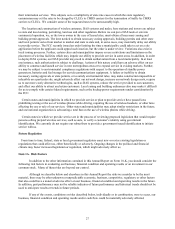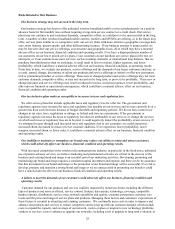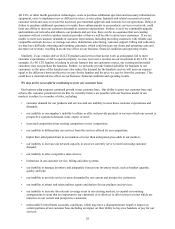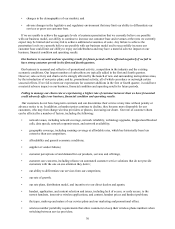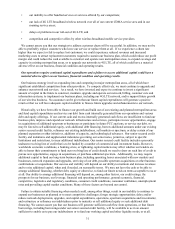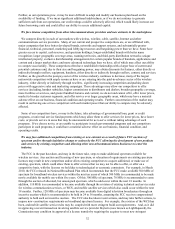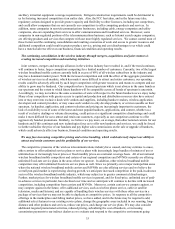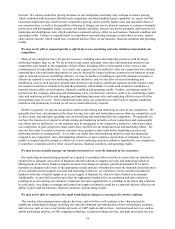Metro PCS 2010 Annual Report Download - page 34
Download and view the complete annual report
Please find page 34 of the 2010 Metro PCS annual report below. You can navigate through the pages in the report by either clicking on the pages listed below, or by using the keyword search tool below to find specific information within the annual report. 24
the National Environmental Policy Act and the National Historic Preservation Act. Under these rules, construction
cannot begin on any structure that may significantly affect the human environment, or that may affect historic
properties, until the wireless provider has filed an environmental assessment with and obtained approval from the
FCC or a local agency. Processing of environmental assessments can delay construction of antenna facilities,
particularly if the FCC or local agency determines that additional information is required or if community opposition
arises. In addition, several environmental groups have requested various changes to the FCC’s environmental
processing rules, challenged specific environmental assessments as failing statutory requirements and sought to have
the FCC conduct a comprehensive assessment of the environmental effects of antenna tower construction. The FCC
also has been ordered by the Court of Appeals for the DC Circuit to further consider the impact that communications
facilities, including wireless towers and antennas, may have on migratory birds, and the FCC has initiated a
proceeding to do so. In the meantime, there are a variety of federal and state court actions in which citizen and
environmental groups have sought to deny individual tower approvals based upon potential adverse impacts to
migratory birds.
Bill Shock. In October 2010, the FCC proposed and sought comment on rules that would require mobile service
providers to issue real time usage and billing alerts to consumers to assist them in avoiding unexpectedly high bills.
These alerts would include notifications when a consumer approaches their allocated limit for voice, text or data
usage, and when a consumer reaches their monthly limit and begins incurring overage charges. The FCC did ask
whether prepaid mobile services should be exempt from any usage alert requirements. Any such usage requirements
could increase our operational expenses. The likely timing and outcome of this proceeding are uncertain.
Communications assistance for law enforcement act (CALEA). Federal law requires CMRS carriers to assist law
enforcement agencies with lawful wiretaps, and imposes wiretap-related record-keeping and personnel-related
obligations. Historically, our customer base may have been, and may continue to be, subject to a greater percentage
of law enforcement requests than those of other carriers and, as a result, our compliance expenses may be
proportionately greater.
Number administration. Because demand is increasing for a finite pool of telephone numbers, the FCC has
adopted number pooling rules that govern how telephone numbers are allocated. Number pooling is mandatory
inside the wireline rate centers that are located in counties included in the top 100 MSAs. We have implemented
number pooling procedures and support pooled number roaming in all of our metropolitan areas which are in the top
100 MSAs. The FCC also has authorized states to supplement federal numbering requirements in certain respects
and some of the states where we provide service have been authorized by the FCC to engage in limited numbering
administration. Our ability to access telephone numbers on a timely basis is important for our ability to continue to
grow our business.
Regulatory fees. We are obligated to pay certain annual regulatory fees and assessments to support FCC wireless
industry regulation, as well as fees supporting federal universal service programs, number portability, regional
database costs, centralized telephone numbering administration, telecommunications relay service for the hearing-
impaired and application filing fees. These fees are subject to change periodically by the FCC and the manner in
which carriers may recoup these fees from customers is subject to various restrictions.
Number portability. The FCC has ordered all telecommunications carriers, including CMRS carriers, to support
telephone number portability which enables subscribers to keep their telephone numbers when they change
telecommunications carriers, whether wireless to wireless or, in some instances, wireline to wireless, and vice versa.
Under these local number portability rules, a CMRS carrier located in one of the top 100 MSAs must have the
technology in place to allow its customers to keep their telephone numbers when they switch to a new carrier.
Outside of the top 100 MSAs, CMRS carriers receiving a request to allow end users to keep their telephone numbers
must be capable of doing so within six months of the request. All CMRS carriers are required to support nationwide
roaming for customers retaining their numbers.
Equal access. At present, CMRS carriers are exempt from the obligation to provide equal access to interstate long
distance carriers. However, the FCC has the authority to impose rules requiring unblocked access through carrier
identification codes or 800/888 numbers to long distance carriers so CMRS customers are not denied access to their
chosen long distance carrier, if the FCC determines the public interest so requires. Our customers have access to
alternative long distance carriers using toll-free numbers.
Customer proprietary network information (CPNI). FCC rules impose restrictions on a telecommunications
carrier’s use of customer proprietary network information, or CPNI, without prior customer approval, including


